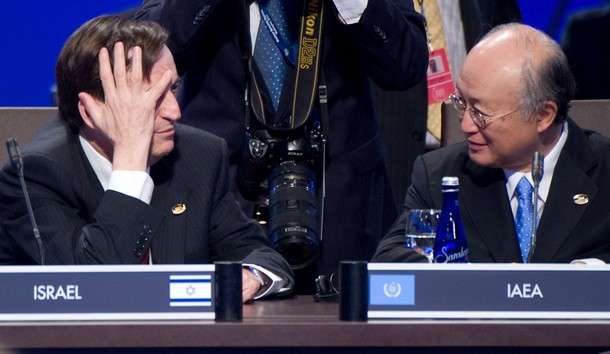by Peter Jenkins
The nuclear agreement with Iran opens the way to forging a nuclear-weapon-free zone (NWFZ) in the Middle East. Until now a Middle East NWFZ has had the hallmarks of a hopeless cause. It’s been all too easy for Israel to use fears aroused by Iran’s nuclear program to oppose the notion. The July 14 agreement deprives Israel of that excuse.
Here are two suggestions for realizing a concept that has proved its worth as a non-proliferation tool in several other parts of the world.
The first relates to the 2015 General Conference of the International Atomic Energy Agency (IAEA to be held in Vienna September 14-18. One item on the agenda is “Application of IAEA Safeguards in the Middle East.”
Israeli Accession to the NPT
This year’s conference can be an opportunity for IAEA member states to adopt a resolution encouraging Israel (an IAEA member) to adhere to the Nuclear Non-Proliferation Treaty (NPT) and submit all the nuclear material in its possession to the comprehensive nuclear safeguards required by the NPT.
In 2009 the General Conference passed a resolution (GC(53)/RES/17) that included a call on Israel to accede to the NPT and place all its nuclear facilities under comprehensive safeguards. But on that occasion the then members of the European Union and 13 other European states voted against adoption. As a consequence the majority in favor was so small (49 to 45) that the Israeli government could afford to ignore the call for NPT accession.
In explaining that 2009 vote, the representative of the EU and associated states objected to the resolution because it was not calling on all states in the region to accept comprehensive safeguards.
This was a curious justification for opposing the resolution. By September 2009 all states in the Middle East except Israel had adhered to the NPT and had concluded comprehensive safeguards agreements with the IAEA. Israel was the only state missing from the list.
The EU position was scarcely less curious 10 months later when the EU high representative wrote to the IAEA director general about this resolution. She argued that pursuing a non-consensual approach would not contribute to the establishment of a zone free of weapons of mass destruction in the Middle East.
Requiring a consensual approach is a recipe for inertia. It amounts to saying that the IAEA General Conference may invite Israel to submit nuclear material to comprehensive safeguards only after Israel has indicated that such an invitation would be welcome.
That is a way of saying that Israel should be exempt from political pressure to accede to the NPT.
And that, in turn, amounts to a flagrant contradiction of the EU’s oft-stated commitment to achieving universal adherence to the NPT.
It defies logic to cherish the NPT as an instrument for achieving nuclear non-proliferation and a world free of nuclear weapons but to resist a modest attempt to apply political pressure to bring about the accession of one of the last remaining holdouts.
A New Role for the P5+1
The second suggestion is that the five permanent members of the UN Security Council and the EU High Representative, fresh from their diplomatic achievement of consolidating Iran’s commitment to the NPT, embark on a similar process of engagement with Israel.
The goal of the process would be to define an action plan that would enable Israel to feel confident that acceding to the NPT would not entail any compromise to Israeli security.
The Israeli government may well say that it does not wish to engage the P5 and EU on such an issue. If so, the P5+1 would be wrong to take “no” for an answer. They pride themselves on having “brought Iran to the negotiating table.” They should look for ways of bringing Israel to the table. It would be surprising if they needed to resort to measures as drastic as those employed in Iran’s case.
Middle East states deserve the security that NWFZs have brought to Latin America, Africa, South East Asia, the Pacific, and Central Asia. The P5 and EU have a chance now to apply their diplomatic weight to realize a Middle East zone. The EU should set the ball rolling by using this year’s IAEA General Conference to join other IAEA member states in calling on Israel to accept comprehensive nuclear safeguards.






Avner Cohen, the leading historian of the Israeli nuclear project, has written that Israel successfully conducted a zero-yield test of its implosion design on November 2, 1966, and had enough plutonium available by the end of 1966 to build a nuclear device. The NPT defines a nuclear weapons state as “one which has manufactured and exploded a nuclear weapon or other nuclear explosive device prior to 1 January 1967.” If what Cohen states is accurate, Israel could have conducted a successful nuclear explosion prior to 1 January 1967. (This presumes that a “nuclear explosive device” needs to have a nuclear yield, although the term isn’t defined in the treaty.) Thus, if Israel decides to adhere to the NPT, it should do so as a nuclear weapons state, on par with the US, Russia, UK, France, and China.